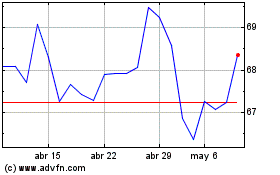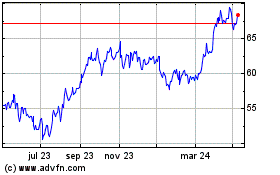Today's Top Supply Chain and Logistics News From WSJ
08 Noviembre 2017 - 6:23AM
Noticias Dow Jones
By Paul Page
Sign up: With one click, get this newsletter delivered to your
inbox.
New air-pollution rules on marine fuel don't go into effect for
more than two years but they're already reverberating across the
energy and shipping industries. Big fuel producers including
ExxonMobil Corp. and Total SA have invested billions to upgrade
refineries to producer lower-sulfur fuel that meets the global
standards, the WSJ's Christopher M. Matthews and Christopher Alessi
write, signaling a shift in maritime energy supply chains as
carriers and shipbuilders adjust to the rule. The International
Maritime Organization has mandated that vessels cut the sulfur
content in their fuel by more than 85% starting in 2020. Ship
operators can either undertake costly retrofits or use cleaner
fuels such as low-sulfur diesel. Container shipping giant CMA CGM
SA is taking another route, announcing it will use liquefied
natural gas to power the nine megaships it recently ordered. That's
the biggest move so far in shipping toward LNG power, and CMA CGM
is already in talks with ports and other suppliers about providing
the infrastructure needed to move beyond bunker fuel.
The Petya cyberattack slowed but didn't stop earnings growth at
the world's biggest container shipping line. Maersk Line earned
$211 million last quarter even as losses from the computer-systems
attack pushed parent A.P. Moller-Maersk into a net loss, the WSJ's
Costas Paris and Ian Walker report. The profit at the liner
business despite the loss of tens of thousands of container
bookings highlights the strength of the broader shipping-industry
recovery, and suggests why Maersk is upbeat about coming quarters.
Maersk says its freight rates were up 14% from a year ago even as
volumes dropped because. Even within Maersk, however, the shipping
rebound hasn't spread evenly. The Damco freight forwarding
operation lost $6 million in the quarter despite rising revenue
while port manager APM Terminals saw profit and margins hurt by
overcapacity. And falling freight shipping rates this quarter along
with rising fuel costs suggest clouds on the horizon.
China's No. 2 e-commerce company is adding some American protein
to its distribution channels. company JD.com plans to import $2
billion worth of U.S. beef and other food products, the WSJ's Lisa
Lin reports, in one of a series of trade agreements being lined up
for President Donald Trump's visit to China. The deal with JD
follows China's agreement in May to allow imports of U.S. beef to
resume after a ban of nearly 14 years on most imports. That could
open a big market for U.S. ranchers that have coped with lower
prices in recent years due to a buildup in supply. It also may give
JD an opening as it targets China's expanding middle class and the
growing demands for higher-quality imported food. The
business-to-consumer operator will add the meat to a growing
perishables distribution line that it's been bulking up this year
with fruits, vegetables and a growing lineup of refrigerated
distribution centers.
SUPPLY CHAIN STRATEGIES
America's love for coffee may have gotten overcaffeinated. The
number of coffee shops across the U.S. has grown by 16% in five
years, the WSJ's Julie Jargon writes, boosting supply chains for
Arabica while hurting business owners as the relentless spread of
specialty coffees cuts into profit margins. The plethora of options
is cutting into business, with consumers visiting traditional
coffee shops less often and spreading their spending from Starbucks
to McDonald's Corp. and the expanding coffee spaces at grocery
stores. The coffee world's woes are similar to those plaguing the
broader food-retail and restaurant industries, which have an
oversupply of retail space competing against a proliferation of new
food options. The storefronts also are being hurt by e-commerce --
not necessarily because people are buying more java online but
simply because they are staying at home rather than out shopping.
That has many storefronts slowing down their growth plans, as if
the jolt from a morning espresso is wearing off.
QUOTABLE
IN OTHER NEWS
In a Guest Voices commentary, MIT's Yossi Sheffi writes
corporations face a "soft skills" shortage in their supply-chain
ranks and that schools can help companies adjust. (WSJ)
The economies of central and southeastern Europe are on course
for their strongest growth year since the financial crisis.
(WSJ)
Russia has ramped up its crude exports this year, potentially
undermining a deal to restrict global supply to boost prices.
(WSJ)
The European Union is poised to propose a 30% cut in
carbon-dioxide emissions from cars and vans through 2030. (WSJ)
Waymo LLC is unleashing the first fleet of robot vehicles on
public roads without humans behind the wheel. (WSJ)
Toyota Motor Corp. is facing shortages of its most popular
vehicles in the U.S. as it seeks to increase sales. (WSJ)
German car maker BMW AG raised its full-year outlook despite a
drop in quarterly revenue and profit from its core business.
(WSJ)
U.S. department stores are putting off new orders from suppliers
as they seek to keep inventories lean this fall. (Reuters)
IKEA struck deals to add distribution centers in Texas outside
Houston and in California north of Oakland. (Houston Chronicle)
Tesla Inc. acquired manufacturing automation company Perbix.
(Bloomberg)
FedEx Corp. expanded an agreement with Walgreen's that will add
pickup and dropoff points in 7,500 U.S. drugstores. (Memphis
Commercial Appeal)
Food suppliers Kraft Heinz and Mondelez International are
pouring big research funding into online consumer sales. ( Chicago
Tribune)
Some 60% of small U.S. trucking companies haven't added the
electronic monitors that will be required starting next month.
(Commercial Carrier Journal)
Third-quarter profit at truckload carrier Schneider National
Inc. was almost flat at $36.9 million, well below expectations.
(Heavy Duty Trucking)
Rail supplier Vertex Railcar Carp. laid off workers for the
second time in a month. (WECT)
The Georgia Ports Authority wants more federal money for a
Savannah River deepening project they say needs $100 million a
year. (Atlanta Journal-Constitution)
The Port of Oakland expects to reduce its diesel emissions by
16% by 2020. (Logistics Management)
British truckers facing chronic severe delays serving London
Heathrow Airport's cargo facilities. (Motor Transport)
ABOUT US
Paul Page is deputy editor of WSJ Logistics Report. Follow him
at @PaulPage, and follow the entire WSJ Logistics Report team:
@brianjbaskin , @jensmithWSJ and @EEPhillips_WSJ. Follow the WSJ
Logistics Report on Twitter at @WSJLogistics.
Write to Paul Page at paul.page@wsj.com
(END) Dow Jones Newswires
November 08, 2017 07:08 ET (12:08 GMT)
Copyright (c) 2017 Dow Jones & Company, Inc.
TotalEnergies (EU:TTE)
Gráfica de Acción Histórica
De Mar 2024 a Abr 2024

TotalEnergies (EU:TTE)
Gráfica de Acción Histórica
De Abr 2023 a Abr 2024
